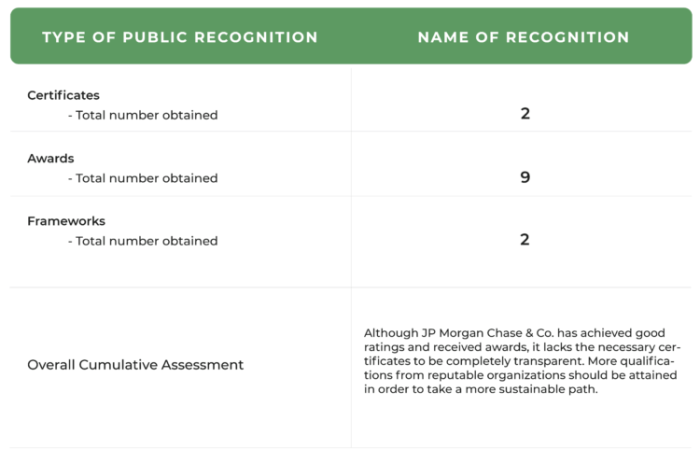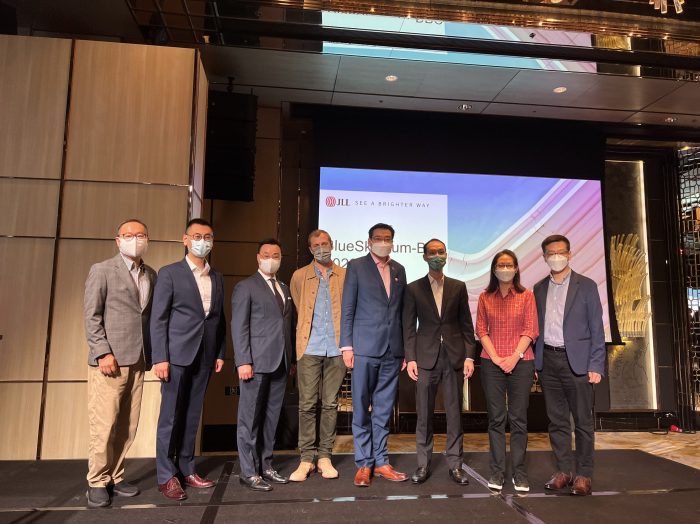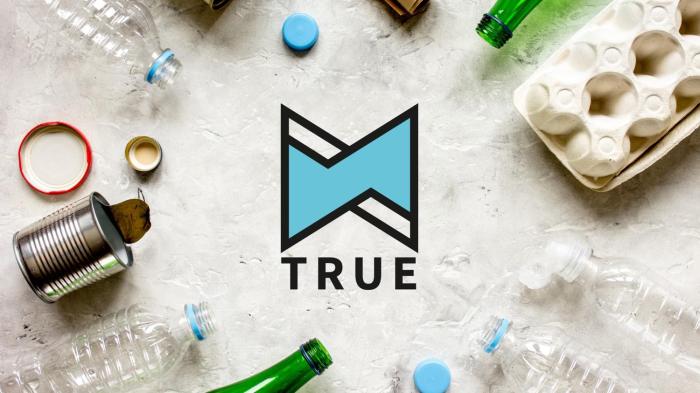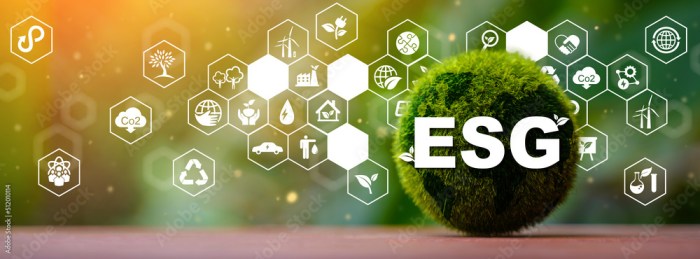Dells Sustainability A Comprehensive Overview
Sustainability: Dell encompasses a multifaceted approach to environmental responsibility across its entire operation, from product design to supply chain management and stakeholder engagement. This exploration delves into Dell’s initiatives, highlighting their efforts to reduce environmental impact, promote ethical sourcing, and foster a sustainable future.
The report analyzes Dell’s sustainability initiatives across five key areas: their declared goals and product lifecycle impact reduction, sustainable product design and end-of-life management, responsible supply chain practices, stakeholder engagement strategies, and future sustainability plans. Comparisons with key competitors are also included to provide context.
Dell’s Sustainability Initiatives
Dell is actively pursuing a range of sustainability initiatives, recognizing the importance of minimizing its environmental footprint throughout its operations. This commitment extends across the entire product lifecycle, from material sourcing to manufacturing, use, and end-of-life management. The company aims to achieve a positive impact on the planet while continuing to deliver innovative and reliable technology solutions.
Dell’s Sustainability Goals and Initiatives
Dell has publicly declared several key sustainability goals. These goals typically involve targets for reducing carbon emissions, improving energy efficiency, and increasing the use of recycled materials. They are usually expressed as quantified targets over specific time horizons.
Product Lifecycle Environmental Impact Reduction
Dell implements various strategies to reduce its environmental impact throughout a product’s lifecycle. This includes designing products with reduced material use, utilizing recycled content, and optimizing manufacturing processes to minimize waste and emissions. The goal is to lessen the overall environmental impact associated with the production, use, and disposal of Dell’s products. Specific examples include using lighter materials in product design and implementing closed-loop recycling programs.
Responsible Sourcing of Materials
Dell is committed to responsible sourcing practices. This means procuring materials ethically and sustainably, minimizing the environmental impact of the supply chain. They frequently partner with suppliers to ensure compliance with ethical labor standards and environmental regulations. They actively seek to source materials from suppliers with strong sustainability records. The company strives to ensure that the raw materials used in its products are sourced responsibly and do not contribute to deforestation or other environmental damage.
Energy Efficiency in Manufacturing and Operations
Dell prioritizes energy efficiency in its manufacturing facilities and operations. This involves implementing energy-efficient technologies, optimizing processes, and actively seeking renewable energy sources. Dell aims to decrease its overall energy consumption, and in turn, the carbon footprint of its operations. This might include the installation of solar panels at manufacturing facilities and optimizing the energy usage of servers.
Sustainable Packaging
Dell has established sustainable packaging strategies. These strategies emphasize the use of recycled and renewable materials, reducing packaging volume, and minimizing waste. This commitment is driven by the goal of reducing the environmental impact of packaging across the product lifecycle. Dell aims to reduce the environmental impact of packaging by implementing strategies that reduce its overall volume and weight, and by utilizing recycled and renewable materials.
Comparison of Sustainability Initiatives (Dell, HP, Lenovo)
| Initiative | Dell | HP | Lenovo |
|---|---|---|---|
| Carbon Emissions Reduction | Setting targets for reducing carbon emissions across the supply chain. | Implementing strategies for carbon emission reduction in manufacturing and operations. | Establishing targets for reducing carbon footprint throughout the product lifecycle. |
| Renewable Energy Usage | Exploring opportunities for using renewable energy sources in operations. | Increasing the use of renewable energy sources in their facilities. | Actively seeking renewable energy sources for its manufacturing and data centers. |
| Recycled Content in Products | Utilizing recycled materials in product design. | Increasing the percentage of recycled materials in their products. | Implementing policies for using recycled materials in product manufacturing. |
Note: Data for this comparison table is based on publicly available information. Specific details and targets may vary.
Sustainability Metrics
Dell utilizes various key metrics to track its sustainability progress. These metrics typically include carbon emissions, energy consumption, water usage, waste generation, and the use of recycled materials. These metrics are tracked to measure the effectiveness of sustainability initiatives and allow for continuous improvement. Dell reports on its progress regularly, providing transparency to stakeholders.
Dell’s Product Sustainability
Dell is committed to minimizing the environmental impact of its products throughout their life cycle. This commitment extends from the materials used in manufacturing to the end-of-life management of those products, aiming for a more circular economy approach. This section details Dell’s efforts in product sustainability, focusing on various product categories, material choices, and lifecycle management strategies.
Environmental Impact of Dell Product Categories
Dell products, ranging from laptops and desktops to servers and storage solutions, have varying environmental footprints. The impact is influenced by factors such as material sourcing, manufacturing processes, energy consumption during operation, and eventual disposal. For instance, servers, due to their higher power consumption, have a larger operational impact compared to laptops. Careful consideration of these factors is crucial for reducing the overall environmental footprint.
Sustainability Features in Dell’s Current Product Line Compared to Previous Generations
Dell has progressively incorporated sustainability features into its products over the years. Significant improvements in energy efficiency and the use of recycled materials are noticeable. Previous generations often relied on more resource-intensive materials and manufacturing processes. Dell’s current line exhibits notable advancements in these areas, contributing to a reduced environmental impact.
Dell Products with Specific Sustainability Features
Dell offers a range of products incorporating sustainability features. These include:
- Laptops utilizing recycled aluminum and plastics.
- Desktops incorporating energy-efficient components such as low-power processors and optimized cooling systems.
- Servers are designed with advanced power management capabilities, enabling optimized energy consumption during operation.
- Various products contain recycled content in their manufacturing processes, such as circuit boards and plastic casings.
Environmental Certifications for Dell Products
Dell products hold various environmental certifications that validate their sustainability efforts. These certifications demonstrate compliance with specific standards related to energy efficiency, material sourcing, and manufacturing processes.
| Product Category | Environmental Certifications |
|---|---|
| Laptops | Energy Star, EPEAT |
| Desktops | Energy Star, EPEAT |
| Servers | Energy Star, Tiered efficiency ratings |
Dell’s Approach to Product End-of-Life Management
Dell actively manages the end-of-life of its products, focusing on recycling and reuse initiatives. This includes establishing take-back programs and partnering with recycling facilities to ensure responsible disposal. Dell’s programs aim to minimize waste and maximize the recovery of valuable materials. Dell aims to contribute to a closed-loop system, minimizing landfill waste and maximizing the use of recycled materials in new products.
Dell’s Contribution to Circular Economy Principles
Dell’s product lifecycle management practices align with circular economy principles. This involves designing products for recyclability, using recycled materials, and implementing take-back programs to facilitate material recovery. These strategies contribute to reducing waste and maximizing the reuse of valuable materials, supporting the transition to a more sustainable economy.
Materials Used in Dell Products and Their Environmental Impact
The materials used in Dell products have varying environmental impacts. Factors include the sourcing of materials, the energy consumed during production, and the potential for waste generation during the product’s lifespan. Dell’s focus is on reducing the environmental footprint of its materials through the use of recycled materials and sustainable sourcing practices. For instance, using recycled plastics in laptop casings or procuring aluminum from sources with low environmental impact reduces the overall environmental burden.
Dell’s Supply Chain Sustainability
Dell recognizes the crucial role its supply chain plays in achieving its sustainability goals. A responsible and sustainable supply chain is not just a desirable attribute but a fundamental necessity for long-term success. This commitment extends beyond minimizing environmental impact to fostering ethical labor practices throughout the entire network.
Dell’s approach to supply chain sustainability is multifaceted, encompassing policies for responsible sourcing, emission reduction strategies, and a robust framework for supplier selection and monitoring. This approach is vital for maintaining Dell’s reputation and fostering trust among stakeholders.
Sustainable Sourcing of Raw Materials
Dell has established clear guidelines for sustainable sourcing, prioritizing materials with minimal environmental impact. This involves collaborating with suppliers to identify and implement more sustainable practices in the extraction, processing, and transportation of raw materials. These policies encompass the use of recycled materials, renewable energy sources, and the reduction of harmful emissions in the manufacturing process. A key aspect of this strategy is the selection of suppliers who demonstrate a commitment to similar sustainability standards.
Emissions Reduction in the Supply Chain
Dell actively seeks to reduce its carbon footprint across its supply chain. This involves encouraging suppliers to adopt energy-efficient technologies, optimize transportation routes, and transition to renewable energy sources. Dell employs various metrics and benchmarks to monitor the progress of its suppliers and the effectiveness of its programs. This commitment to reducing emissions in the supply chain demonstrates Dell’s proactive stance in tackling climate change.
Key Suppliers and Their Sustainability Records
Dell maintains a detailed database of its key suppliers, assessing their performance against predefined sustainability criteria. These criteria cover areas such as environmental impact, labor practices, and ethical sourcing. This database provides insights into the overall sustainability performance of the supply chain, allowing Dell to identify areas needing improvement and track progress over time. However, specific supplier names and records are not publicly disclosed due to commercial confidentiality.
Ethical Labor Practices in the Supply Chain
Dell’s commitment to ethical labor practices in its supply chain is evident in its stringent policies. These policies ensure fair wages, safe working conditions, and the prohibition of child labor. This commitment extends to fostering open communication and collaboration with suppliers to ensure compliance.
| Aspects of Ethical Labor Practices | Dell’s Approach |
|---|---|
| Fair Wages | Dell mandates that suppliers adhere to fair labor standards and provide competitive wages commensurate with local market conditions. |
| Safe Working Conditions | Dell’s standards require suppliers to maintain safe and healthy work environments, complying with all applicable local and international regulations. |
| Child Labor Prohibition | Dell strictly prohibits child labor in its supply chain, requiring suppliers to implement measures to prevent its occurrence. |
| Freedom of Association | Dell supports the right of workers to form unions and bargain collectively, ensuring freedom of association and collective bargaining rights. |
Comparison with Competitors
Dell’s supply chain sustainability initiatives are comparable to those of leading competitors, although specific details on competitor practices are not readily available for a comprehensive comparative analysis. Many competitors share similar goals, though the implementation and enforcement of policies may vary. Dell’s ongoing efforts highlight its commitment to a more sustainable and responsible supply chain.
Supplier Selection Criteria
Dell’s supplier selection criteria are designed to ensure a high level of sustainability across its entire supply chain. These criteria cover a wide range of factors, from environmental performance to ethical labor practices.
| Category | Criteria |
|---|---|
| Environmental Performance | Energy efficiency, waste management, water usage, greenhouse gas emissions, and adherence to environmental regulations. |
| Ethical Labor Practices | Fair wages, safe working conditions, the prohibition of child labor, and respect for human rights. |
| Financial Stability | Demonstrated financial stability and commitment to long-term partnerships. |
| Quality and Reliability | Consistent quality standards and reliable supply chain performance. |
Potential Environmental Risks in the Supply Chain
Potential environmental risks in Dell’s supply chain include resource depletion, pollution from manufacturing processes, and inefficient transportation methods. Addressing these risks necessitates ongoing monitoring and collaboration with suppliers to mitigate environmental damage. Dell actively works to minimize these risks through its ongoing sustainability initiatives.
Dell’s Stakeholder Engagement on Sustainability

Source: ccsmedia.com
Dell actively engages with a broad range of stakeholders to drive its sustainability initiatives forward. This engagement encompasses a diverse spectrum of activities, from transparent reporting to fostering partnerships with NGOs and directly involving employees. This commitment to open dialogue and collaborative action is crucial for Dell’s ongoing sustainability journey.
Dell recognizes the importance of incorporating diverse perspectives in its sustainability efforts. This approach is critical to achieving long-term success and ensuring that sustainability goals align with the needs and expectations of all stakeholders.
Dell’s Communication Strategies Regarding Sustainability
Dell employs a multifaceted communication strategy to keep stakeholders informed about its sustainability progress. This includes regular publications, such as sustainability reports, detailing environmental performance and social impact. They use various channels, such as their website and social media platforms, to disseminate information about their initiatives. Consistent communication fosters transparency and builds trust with stakeholders.
Examples of Dell’s Partnerships with NGOs and Other Organizations
Dell collaborates with numerous NGOs and organizations dedicated to environmental and social causes. These partnerships often involve joint projects focused on specific sustainability goals. Examples include initiatives to support responsible sourcing, promote educational opportunities, and conserve natural resources. These partnerships demonstrate Dell’s commitment to leveraging external expertise and resources for collective impact.
Dell’s Engagement with Customers on Sustainability Issues, Sustainability dell
Dell actively engages customers by offering sustainable product options and providing information on how to use their products more sustainably. They also solicit feedback through surveys and focus groups to understand customer needs and preferences related to sustainability. This customer engagement is vital for aligning Dell’s offerings with market demands and building a sustainable future together.
Elaboration on Dell’s Transparency in Reporting its Sustainability Performance
Dell’s sustainability reports are comprehensive, providing detailed information on environmental impact, social responsibility, and ethical sourcing. These reports often utilize standardized metrics to ensure comparability and allow stakeholders to assess Dell’s progress over time. This transparency is critical for building trust and demonstrating accountability.
Detailing Dell’s Employee Engagement Initiatives on Sustainability
Dell recognizes the vital role employees play in its sustainability journey. Initiatives include internal campaigns promoting sustainable practices, employee volunteering programs focused on environmental projects, and training programs focused on sustainability awareness. This proactive approach fosters a culture of sustainability within the company, inspiring employees to become advocates for change.
Table Illustrating Dell’s Key Stakeholders and Their Involvement in Sustainability Efforts
| Stakeholder Group | Involvement in Sustainability Efforts |
|---|---|
| Customers | Providing sustainable product options, feedback collection through surveys and focus groups. |
| Employees | Internal campaigns, volunteering programs, training on sustainability awareness. |
| NGOs and other organizations | Collaborations on joint projects, leveraging external expertise and resources for collective impact. |
| Investors | Transparency in reporting, demonstrating long-term commitment to sustainability. |
| Governments | Adhering to regulations, potentially contributing to policy discussions. |
Dell’s Methods for Collecting Feedback on Sustainability Initiatives
Dell employs various methods to gather feedback on its sustainability initiatives. These include online surveys, focus groups, and feedback forms, which help identify areas for improvement and ensure that initiatives are aligned with stakeholder expectations. Regularly soliciting feedback is crucial for iterative improvement and maintaining relevance in the ever-evolving sustainability landscape.
Dell’s Future Sustainability Strategies
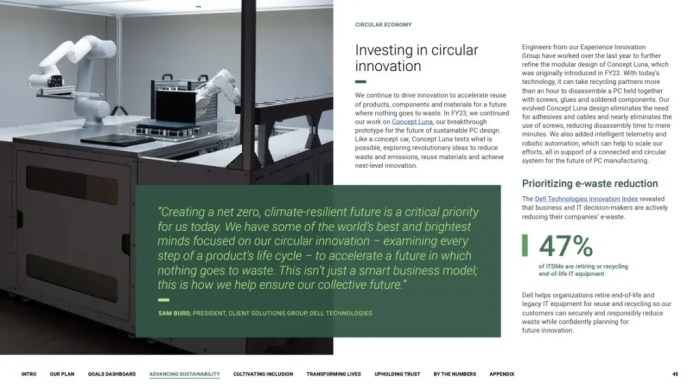
Source: techfinitive.com
Dell’s commitment to sustainability extends beyond its current initiatives. The company recognizes the evolving landscape of environmental and social concerns, and future strategies must address emerging challenges and opportunities. This involves proactive adaptation to changing regulations, investment in innovative technologies, and a deep integration of sustainability into its corporate culture.
Dell’s future sustainability strategy necessitates a comprehensive approach encompassing product lifecycle management, supply chain optimization, and stakeholder engagement. This proactive approach will ensure that Dell remains a leader in responsible business practices.
Potential Future Trends and Challenges
Several key trends will shape the future of sustainability for Dell. These include the increasing demand for circular economy models, the growing importance of renewable energy sources, and stricter governmental regulations on environmental impact. Challenges include maintaining competitive pricing while adhering to sustainability standards and balancing the need for innovation with the imperative to reduce environmental impact.
Emerging Technologies Impacting Dell’s Sustainability Initiatives
Emerging technologies offer significant potential for Dell’s sustainability efforts. These include advancements in renewable energy technologies, such as improved battery storage and solar energy systems, and the development of more efficient manufacturing processes. The integration of AI and machine learning can also optimize resource allocation and minimize waste.
Potential Investment Areas in Sustainable Technologies
| Technology Area | Potential Investment Rationale | Examples |
|---|---|---|
| Renewable Energy Sources | Transitioning to renewable energy sources reduces reliance on fossil fuels and lowers carbon emissions. | Investing in solar farms, wind farms, and expanding partnerships with renewable energy providers. |
| Sustainable Materials | Implementing sustainable materials reduces the environmental impact of products throughout their life cycle. | Utilizing recycled plastics, bio-based materials, and developing processes to minimize material waste. |
| Circular Economy Models | Adopting circular economy principles extends the lifespan of products and minimizes waste. | Developing repair and refurbishment programs, implementing product take-back schemes, and creating closed-loop systems for material recovery. |
| Advanced Manufacturing Processes | Optimizing manufacturing processes reduces energy consumption and material waste. | Investing in automation, using 3D printing for customized production, and developing more energy-efficient manufacturing facilities. |
Innovative Approaches to Achieve Sustainability Goals
Dell can adopt innovative approaches to meet its sustainability goals. For example, partnering with universities and research institutions to accelerate the development of sustainable technologies and developing comprehensive product lifecycle assessments for all products to identify areas for improvement and inform design decisions. Implementing comprehensive carbon footprint assessments and setting ambitious yet achievable reduction targets are crucial steps in this journey.
Adapting to Evolving Regulatory Requirements
Staying ahead of evolving sustainability regulations is critical for Dell. The company should proactively monitor and analyze emerging regulations to ensure compliance and anticipate future requirements. This includes investing in resources to assess the impact of regulations and develop strategies for compliance.
Reducing Dell’s Carbon Footprint
Dell can further reduce its carbon footprint through various measures. These include investing in energy-efficient data centers, optimizing supply chain logistics, and implementing sustainable transportation strategies. The use of electric vehicles and alternative fuels in transportation operations would contribute significantly to this reduction.
Integrating Sustainability into Corporate Culture
Integrating sustainability into Dell’s corporate culture is crucial. This includes establishing clear sustainability targets and metrics, providing employee training on sustainability issues, and actively seeking feedback and suggestions from employees to improve sustainability practices. Promoting a culture of environmental awareness and social responsibility is essential for long-term success.
Final Review: Sustainability Dell

Source: co.uk
In conclusion, Dell’s commitment to sustainability is a multifaceted endeavor encompassing the product lifecycle, supply chain, and stakeholder engagement. The company’s efforts, though substantial, face ongoing challenges and opportunities for improvement. The future of Dell’s sustainability initiatives will likely depend on their ability to adapt to evolving environmental regulations and emerging technologies while also maintaining a strong focus on stakeholder engagement and transparency.

